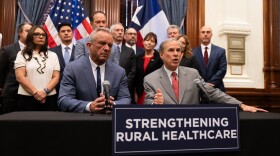-
Texas proposed increases to Medicaid reimbursement rates for certain ambulance services. During a public rate hearing, providers said the higher rates could help maintain access to critical services, especially in rural areas.
-
Kansas received the sixth-highest amount among the states at $221 million.
-
Texas is set to receive the largest award from the federal Rural Health Transformation Program — with federal officials awarding $1.4 billion to the state over five years. The state received millions more in funding that it asked for in its application.
-
Texas' application for the Rural Health Transformation program requests $200 million every year of the five-year program. The state is proposing the "Rural Texas Strong" project, which includes a range of proposals to improve health care access and quality in rural areas — such as workforce development and utilizing AI.
-
Alongside the passage of billions of dollars in Medicaid spending reductions over a decade, Oklahoma is also vying for an opportunity available to all 50 states to fund sustainable rural health care initiatives.
-
As Texas develops its application for federal Rural Health Transformation Program funding, rural hospital leaders say stabilizing their facilities should be a top priority. "Without it, all the planning in the world will not matter because there will be no hospital left to transform," one said.
-
Texas health officials are asking for public input for the state's application for a new federal rural health program. People can submit their comments through Tuesday, Sept. 9.
-
The Health and Human Services secretary praised recent health legislation out of Texas during a visit with Gov. Greg Abbott.
-
The $50 billion rural health fund established in President Donald Trump's megabill seeks to help stabilize and strengthen rural hospitals and providers.
-
Oklahoma health care leaders estimate state hospitals will see $6.3 billion in Medicaid reimbursement cuts as funding reductions made to the program through President Donald Trump's "One Big Beautiful Bill" set in.

Play Live Radio
Next Up:
0:00
0:00
Available On Air Stations









